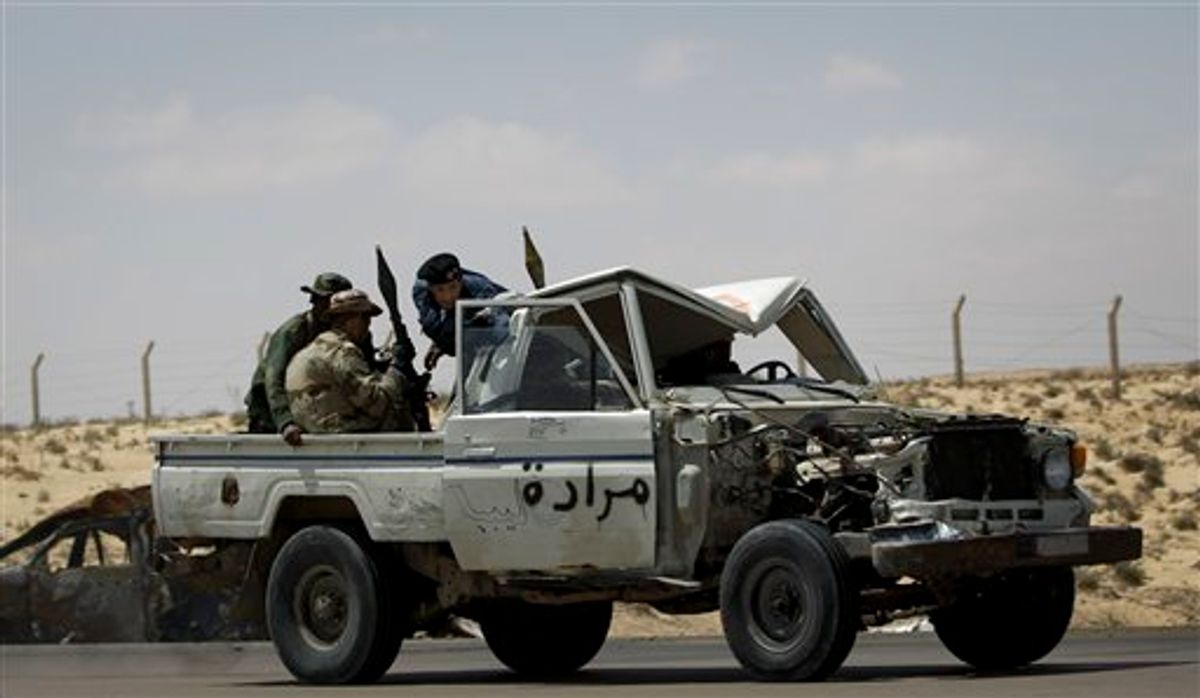Libyan rebels said NATO airstrikes on Sunday helped them drive Moammar Gadhafi's forces out of a hard-fought eastern city that is the gateway to the opposition's stronghold.
Four airstrikes largely stopped what had been heavy shelling of Ajdabiya by government forces, rebel battlefield commander and spokesman Col. Hamid Hassy said. NATO's leader of the operation said the airstrikes destroyed 11 tanks near Ajdabiya and another 14 near Misrata, the only city rebels still hold in the western half of Libya.
Hassy said Gadhafi's forces fled the western gate of Ajdabiya and by mid-afternoon had been pushed back about 40 miles (60 kilometers) west of the city. However, sporadic shelling could still be heard around western Ajdabiya.
Mohammed Idris, the supervisor of the hospital in Ajdabiya, said 38 people died in the fighting over the weekend, including 20 Gadhafi fighters and three rebels killed Sunday.
The main front line in Libya's uprising runs along a highway on the country's northern Mediterranean coast that leads out of the rebels' de facto capital of Benghazi in the opposition-held eastern half of the country and toward the regime's western stronghold in the capital Tripoli.
Government forces are trying to regain territory lost to the opposition, which wants to topple Gadhafi after more than four decades in power. The Gadhafi loyalists have been pounding Ajdabiya in their most sustained offensive since being driven back west by international airstrikes last month.
If Gadhafi's forces took the city, they would have a clear path to Benghazi, Libya's second largest city about 100 miles (160 kilometers) away along the coast.
"If he controls Adjabiya, he makes us feel like we are unsafe because he can move anywhere in the east," Hassy said.
The rebels claimed success as South African President Jacob Zuma and the heads of Mali and Mauritania arrive in Tripoli to try to broker a cease-fire. Gadhafi has ignored the cease-fire he announced after western airstrikes were authorized last month, and the government has rejected the rebels' conditions for a stop in fighting.
Rebels had been growing critical of NATO, which accidentally hit opposition fighters in deadly airstrikes twice this month. They have complained that the alliance was too slow and imprecise, but Hassy said it is getting better.
"To tell you the truth, at first NATO was paralyzed but now they have better movement and are improving," he said.
NATO is operating under a U.N. resolution authorizing a no-fly zone airstrikes to protect Libyan civilians. The airstrikes, initially conducted under U.S. leadership, helped knock Gadhafi's forces back just as they were at the doorstep of Benghazi.
The commander of the NATO operation, Canadian Lt. Gen. Charles Bouchard, stressed in a NATO statement that the point of the airstrikes was to protect civilians, not to work hand-in-hand with the rebels.
"The situation in Ajdabiya, and Misrata in particular, is desperate for those Libyans who are being brutally shelled by the regime. To help protect these civilians we continued to strike these forces hard," Bouchard said.
NATO noted that is enforcing the no-fly zone on both sides, having intercepted a rebel MiG-23 fighter jet that it forced back to the airport Saturday.
In Ajdabiya, shelling could be heard from the hospital in the central part of the city Sunday afternoon.
In the embattled city of Misrata, the lone rebel outpost in the west of the country, residents said shelling continued Sunday, killing one and wounding two others seriously.
"We woke up at 7 a.m. from the tank fire," said a doctor working at the local hospital who spoke on condition of anonymity for fear of reprisal.
Libya's third-largest city has been pounded without cease for more than a month by Gadhafi's heavy weapons, but the rebels have managed to hold out.
The apparent surge in ground fighting could add urgency to the latest peace initiative. Envoys from the African Union planned talks with Gadhafi in Tripoli and rebels in Benghazi during a two-day visit beginning Sunday.
An official from the African bloc, Khellaf Brahan, said its proposals call for an immediate cease-fire, opening channels for humanitarian aid and talks between the rebels and the government. But Gadhafi has insisted he won't step down, while rebels and much of the international community, including the United States, are bent on seeing him go.
In an interview Sunday with CNN, former British Prime Minister Tony Blair said the objective should be to change the regime.
"We've got to keep in our minds, you know, what is our strategic objective," he said. "It is to get a different form of government in place in which the people of Libya decide the future of Libya."
In the capital Tripoli, the deputy foreign minister claimed government forces shot down two U.S.-built Chinook helicopters being used by rebel forces in the east of the country.
Khaled Kaim said the helicopters were shot down near the eastern oil facilities of Brega -- a key objective of rebels -- and accused NATO commanders of a double standard, allowing rebel forces to operate aircraft in "clear violation" of the no-fly zone.
"We have a question for the allied forces -- is this resolution made for the Libyan government only or everyone in Libya?" he asked.
The report could not be confirmed with the rebels, but journalists in the area did describe seeing at least one helicopter apparently fighting for the rebels in the area Saturday, though it lacked the distinctive double rotor design of the Chinook and appeared to be a Russian-built model.
Rebels took a few aircraft from the government when some air force units defected in the east of the country. Most aircraft held by either side are Russian-made, though the Directory of World Air Forces from 2008 says Libya had 20 Chinooks, which are used primarily for transport and heavy lifting.
The government's air force has been effectively grounded since airstrikes began.
Al-Shalchi reported from Tripoli, Libya.



Shares